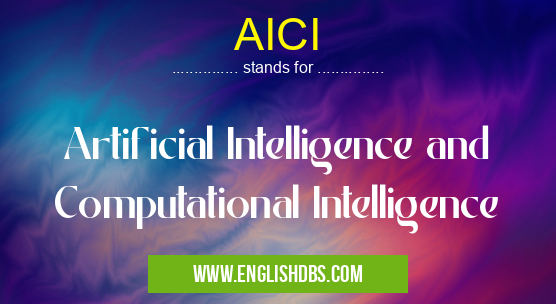What does AICI mean in ARTIFICIAL INTELLIGENCE
AICI stands for Artificial Intelligence and Computational Intelligence, two related yet distinct fields of computer science. AI is a broad field that seeks to create machines capable of intelligent behavior, while CI focuses on creating algorithms to enable automated problem solving. Together, these two branches of research serve to advance the capabilities of computers in an ever-increasing range of tasks. For example, AI and CI can be used for applications such as industrial automation, decision support systems, image recognition, and natural language understanding.

AICI meaning in Artificial Intelligence in Computing
AICI mostly used in an acronym Artificial Intelligence in Category Computing that means Artificial Intelligence and Computational Intelligence
Shorthand: AICI,
Full Form: Artificial Intelligence and Computational Intelligence
For more information of "Artificial Intelligence and Computational Intelligence", see the section below.
Artificial Intelligence
Artificial Intelligence (AI) is the field of computer science which deals with building machines capable of intelligent behavior. Researchers in this field strive to create programs that can learn from data inputs and make decisions on their own. AI is used in a wide range of applications including robotics, machine vision, natural language processing (NLP), speech recognition and autonomous navigation. AI technology has been deployed in a variety of industries such as healthcare and transportation where it improves the efficiency and accuracy of decision making processes. Additionally, AI plays a major role in the development of self-driving cars as well as virtual personal assistants like Amazon's Alexa or Apple's Siri.
Computational Intelligence
Computational Intelligence (CI) is a branch of artificial intelligence which focuses on developing algorithms to solve problems by algorithmic means rather than explicitly programmed instructions. Algorithms are not only used to identify patterns but also to predict outcomes based on previous inputs or simulations. This field combines various disciplines such as pattern recognition, optimization methods, fuzzy logic and neural networks into one interdisciplinary subject area with applications ranging from finance to cognitive science. Many researchers have utilized computational intelligence techniques for advanced gaming experiences or economic forecasting markets due to their capability for efficient exploratory learning within complex systems.
Essential Questions and Answers on Artificial Intelligence and Computational Intelligence in "COMPUTING»AI"
What type of technology is Artificial Intelligence and Computational Intelligence?
Artificial Intelligence and Computational Intelligence are both types of technologies that use algorithms, data, and computing power to automate a process. These methods allow machines and software to learn from data, solve problems, and make decisions in an intelligent manner.
How does Artificial Intelligence and Computational Intelligence differ?
Artificial Intelligence focuses on creating machines that act as if they have cognitive abilities, while Computational Intelligence looks at techniques used to solve complex problems. AI generally requires more computing power than CI, as it works with large datasets in order to generate its results. Whereas CI relies on analyzing smaller datasets through mathematical models or heuristics.
What can Artificial Intelligence and Computational Intelligence be used for?
AI and CI can be used for a variety of tasks ranging from natural language processing to predictions based on large datasets. In addition to this, they can also identify patterns in data sets or detect anomalies in financial markets. AI systems are being applied increasingly in medical diagnostics, robotics, autonomous cars, cyber defense strategies amongst many other applications.
How does one develop an Artificial Intelligence or Computational intelligence system?
Developing an AI or CI system typically involves multiple steps such as gathering the required data, designing the appropriate model/algorithm for data analysis purposes, preparing the training dataset and testing the accuracy of the model against test dataset. It usually requires expertise in machine learning algorithms such as neural networks or deep learning models which need to be tailored according to specific requirements of individual applications.
Is there any potential ethical implications when developing Artificial Intelligences or Computational Intelligences?
Yes! As these technologies become increasingly powerful and ubiquitous there is an added responsibility for researchers and practitioners working with them to ensure that their systems do not introduce any biases into design decisions or produce unintended outcomes due to unforeseen circumstances or edge cases. Thus it is important for developers to consider ethical implications whenever creating new AI & CI systems.
What challenges exist when it comes to using AI & CI technologies?
There are various challenges associated with using these technologies including obtaining sufficient amounts of training data for supervised learning algorithms; ensuring reliable model performance over long periods of time; preventing adversarial attacks; understanding how decisions were made by complex models; maintaining privacy when dealing with sensitive user data etc. Additionally, selecting appropriate algorithms/models while keeping improved accuracy goals in mind also presents a challenge.
How expensive is it to research/implement Artificial Intelligent/Computation Intelligent solutions?
Costs associated with researching/implementing these solutions vary greatly depending upon scale of application along with complexity involved during development phase while meeting certain performance goals (such as increased accuracy). In most cases setting up basic AI & CI infrastructure might involve licensing fees associated with cloud platforms & services along with hardware costs like GPUs amongst others depending upon individual case requirements.
Are there safety regulations surrounding uses of artificial intelligence/computation intelligence solutions?
Yes! Generally regulatory bodies around the world evaluate risks posed by emerging technology solutions before allowing them for deployment within public domains which includes both consumer facing products & enterprise level solutions which handle sensitive information about users like financial records etc. Thus proper safety regulations need to be taken into account before deploying any form of AI & CI solutions due the risks involved.
Final Words:
In summary, AICI stands for Artificial Intelligence and Computational Intelligence — two important fields in modern computer science which continue to intersect with one another to bring further advancement across various industries. Together both technologies have enabled us to achieve remarkable results from predictive analysis models built from powerful computing resources that are accessible today.
AICI also stands for: |
|
| All stands for AICI |
